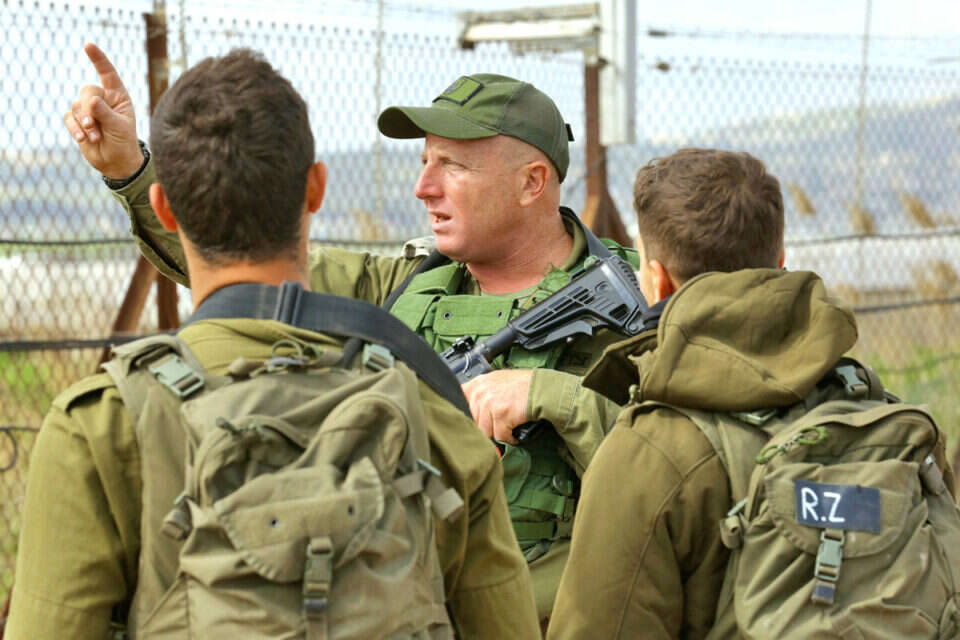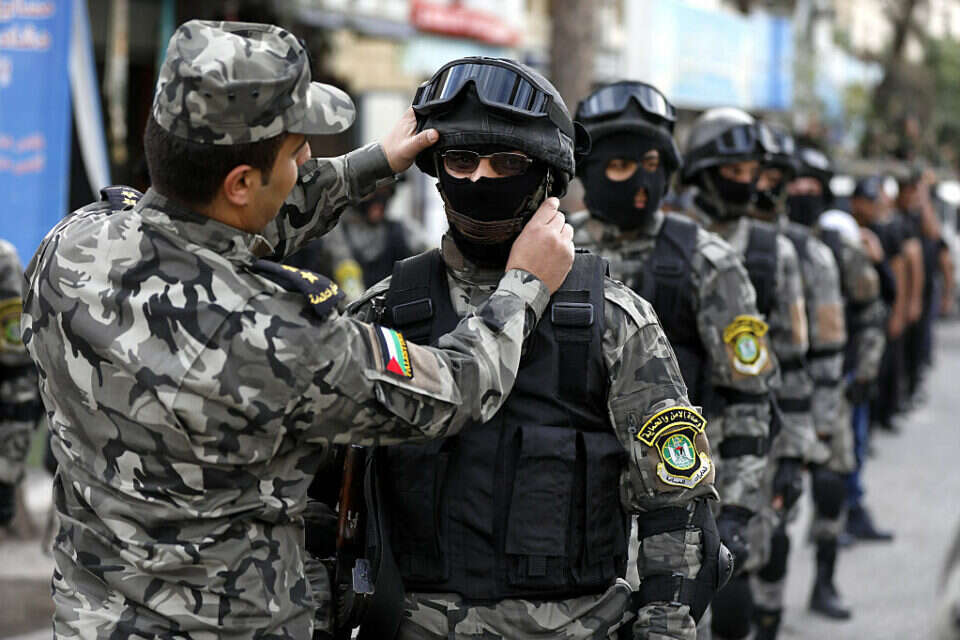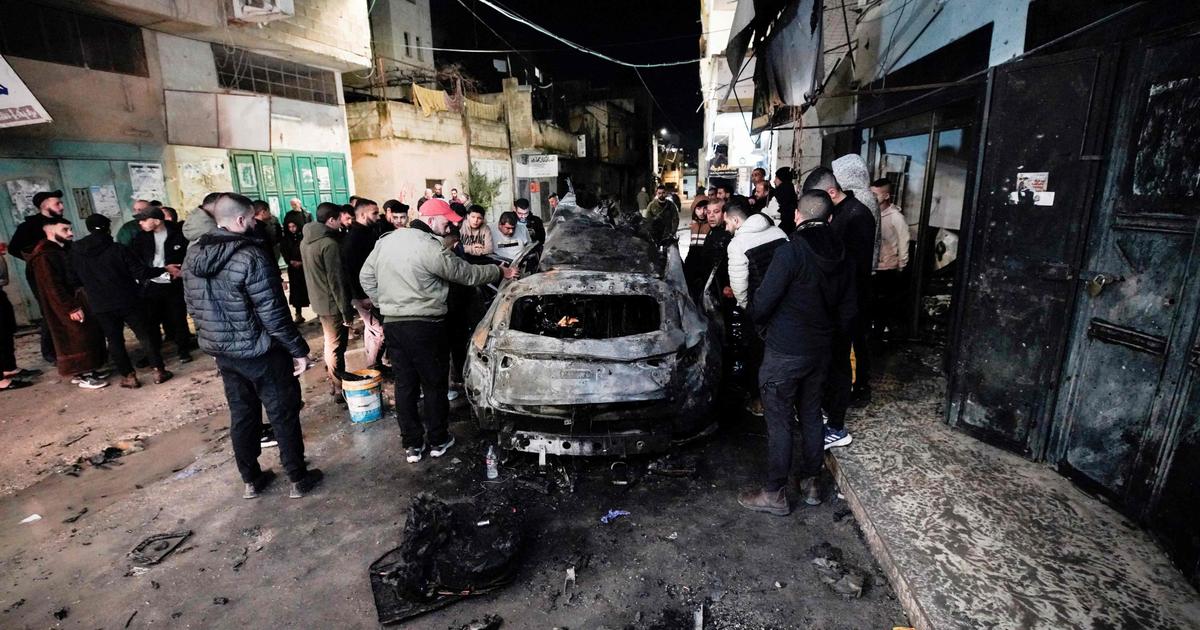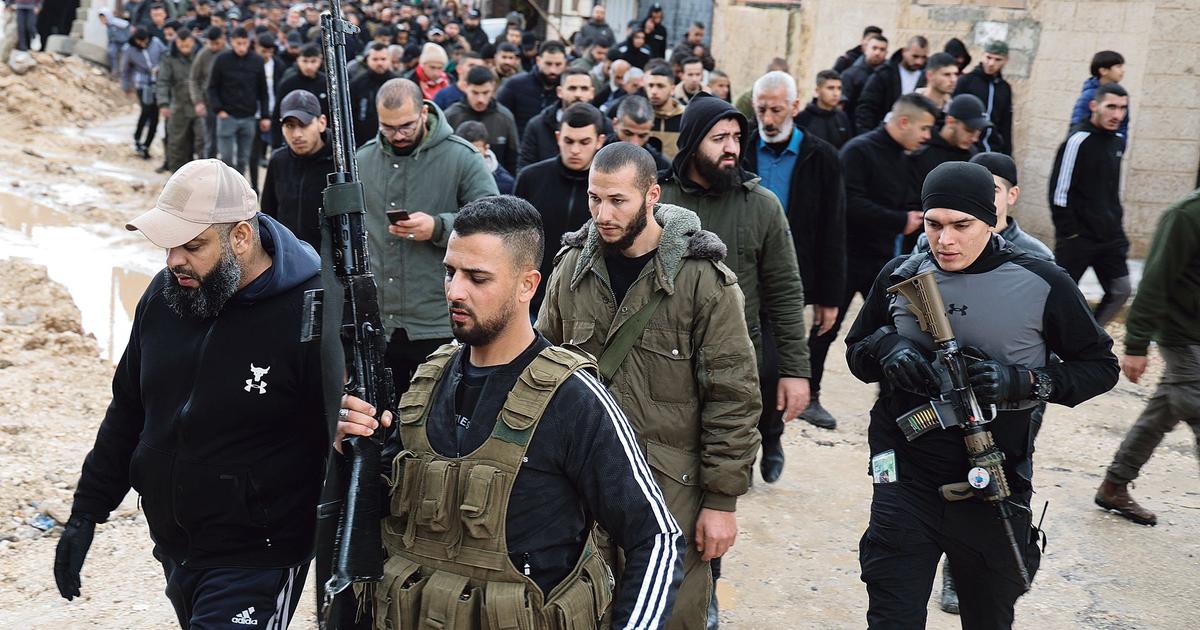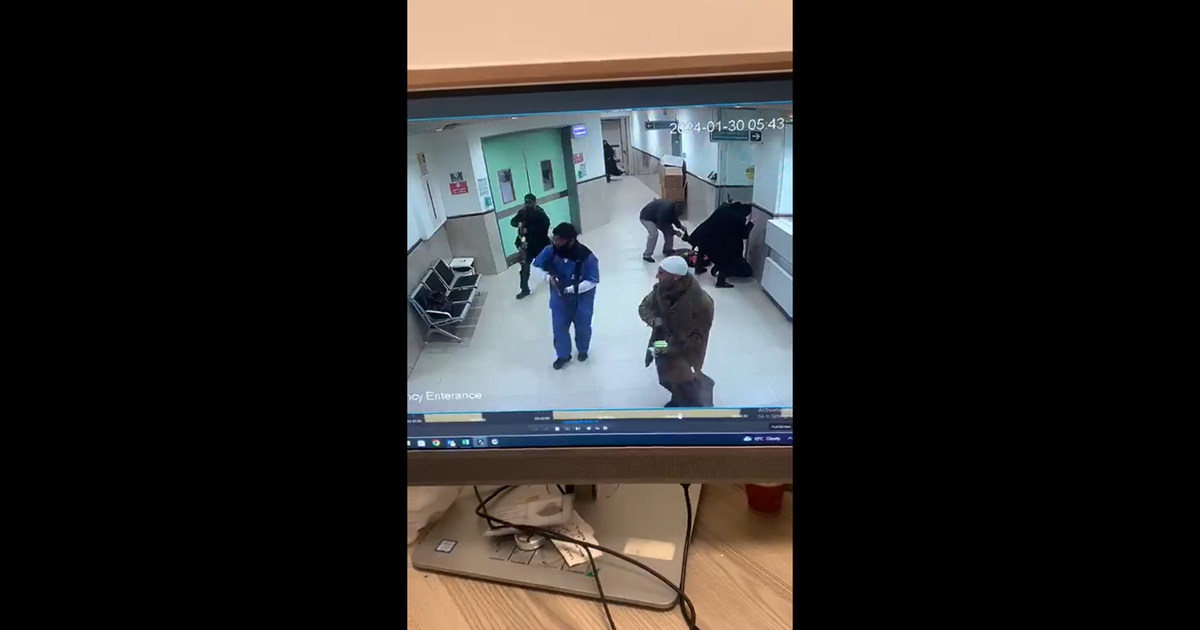In recent weeks, Jenin has become the main center of terrorism in Samaria, and hence the IDF's main center of activity.
Both of these attacks led the IDF and the GSS to storm northern Samaria.
Many forces and means were transferred to the sector in an attempt to stem the tide of terrorism.
The fear is that the continuation of the attacks will require more extensive action, which will also ignite other sectors in Judea and Samaria, and possibly also East Jerusalem and Gaza.
It is a complex, security-civic-economic effort that seeks to differentiate between those involved in terrorism and citizens who just want to go out and work, and between the various sectors.
Its main focus is now on the Jenin sector, with the task defined for the forces being "to prevent the next attack at all costs," according to Brigadier General Menashe (Jenin), Col. Arik Moyal.
In a special interview, his first since taking office, Moyal says there is no limit to operational activity, and will not be.
"We will act wherever necessary, and at any time," he clarifies.
"Our mission is to stop the wave, and restore calm to this sector. We will not stop until that happens, it will take as much as it takes."
Wait for the day after
He is 41 years old. Eight months old.) Originally from Be'er Sheva, and currently lives in Tapuach.
He was a battalion commander in the Nahal and an operations officer in the Southern Command, a position at which he completed a master's degree in business administration.
Moyal has not been home for four consecutive Saturdays since the current wave of terror began.
An event chases an event, and each day brings with it the activities of the next night, and returns for goodness sake.
He lives on a few hours of sleep, and on many cups of coffee.
But despite the intensity, he makes sure to convey comfort, and most importantly - speaks at eye level.
Understands the responsibility, but not all the truth is with him.
That's why it's worth listening to.
Anyone who accuses him of lack of attacks or blinking in the face of terrorism does not know the man and does not know what he is talking about.
As a resident of Tapuach - one of the more ideological settlements in Samaria - one should not teach him about determination.
On the other hand, he understands that life in this sector is complicated, and that the Palestinians will not disappear from here anywhere.
"We can kill wanted people every hour. It's really not a problem. I can end any operation with casualties on the other side, but it will not lead to anything," he says.
"It is my duty to see a broader picture. To understand that any incident with casualties could ignite my sector, and possibly all of Judea and Samaria. We want to prevent it, so an arrest operation that ends without casualties is an achievement for me - and that is what I demand of the forces."
He is convinced that it is the duty of the commanders in the field to look broadly.
Think also about the day after.
Understand the sensitivity.
"In the long run, we want a different reality here. The economy in Jenin has been insane in recent years. On Saturdays, more than 3,000 vehicles of Arab-Israelis enter through the Jalama checkpoint (Gilboa; YL).
They come here to shop, leaving millions of shekels in Jenin.
The shops and commerce are flourishing.
The rents are sky high, and so is the revenue.
It's good for the local economy, and it's good for us because they have something to lose. "
He is convinced that most of Jenin's residents hate the refugee camp, and the reality that the entire sector has been drawn to because of it.
"The majority here want to live, eventually. Make a living. They understand that the refugee camp is taking them back. That the terror that comes out of it is knocking them out. They would be very happy if we took care of this place."
The same door turns
The Jenin refugee camp has always been synonymous with Muqawama - the Palestinian resistance.
On the eve of Operation Defensive Shield, convoys of terrorist attacks on Israeli cities left the camp;
Senior terrorists, mostly from Islamic Jihad, operated unhindered, produced explosive devices and recruited suicide bombers.
The most difficult battle in the Defensive Wall was also in the Jenin refugee camp.
After the occupation of the other West Bank cities passed relatively easily as expected, the IDF encountered stubborn resistance in Jenin. In the battles in the refugee camp, 23 fighters were killed, including 13 reservists in one day.
As a result, a parallel ethos was created: Israeli - of an uncompromising war on terror, until its submission;
And Palestinian - of uncompromising war in occupation.
Moyal believes that defensive wall events are relevant in the current round as well.
"They heard and saw the talk we've had recently around 20 years for a defensive wall, and it excited them. Not only do we want to build a narrative, they do too. It's a story they fuel, and part of it is the attacks and terrorist attacks we see now."
The troubles from the Jenin refugee camp began even before the current wave of terrorism.
In fact, things have been quiet there for more than a year.
It started with the corona and the economic troubles it brought with it - which as always have a greater impact on the poor - and it continued with the steep decline in Palestinian Authority governance in northern Samaria in general, and in the Jenin refugee camp in particular.
As a result, the Palestinian security forces refrained from entering the camp, which in effect became an independent enclave, which seized security and impudence.
Things reached a climax when gunmen from the camp opened fire at the Palestinian police station in Jenin, an incident that resulted in the dismissal of all top security officials in the sector.
"We have warned the Palestinian Authority, and demanded that they act to restore governance there, but they are failing to do so," Moyal said.
"They are in a difficult trap. There is a new police chief, because the previous one was fired, but he is afraid of being seen as a collaborator with us. This week I saw that he arrived in uniform at the mourning tent of the terrorist who carried out the attack in Tel Aviv, together with the governor of Jenin.
I wondered what he was thinking to himself, because he too knows that these terrorists are his enemies, and it is clear to him that being there is a very problematic message, because he is actually embracing them and implying to them that he is with them.
I can understand the trap he is in, even though his presence there made me very angry. "
Despite this, Moyal is convinced that cooperation with the Palestinian security forces is necessary.
"It's true that they hardly enter the refugee camp because they are afraid, but I hope that in the future they will enter, as in the past. But cooperation with them does take place. The same revolving door that we know from the past, they stop and then release. "
"I have no restrictions"
The IDF returned to operating intensively in Jenin only in early February. Until then, for several months, it refrained from overt and intense activity, in an attempt to allow the Palestinian security forces to rehabilitate their position in the sector and regain governance. This was a conscious decision That security cooperation between the parties is necessary for the fight against terrorism.
Moyal clarifies that the absence of overt activity does not mean that there was no activity at all.
"Even in these months we acted quite a bit, but in other methods. Sometimes we acted riotously, and sometimes the GSS made the wanted people go out and there we caught them.
All the criticism that we did nothing is far from reality. "
"Mostly driven by inspiration."
Riots in Jenin, this week, Photo: AFP
Moyal refers, among other things, to an article published this week in "Israel Today" by one of his predecessors, Col. (Res.) Oren Zini, which attacked the lack of operational activity in northern Samaria in the months leading up to the current wave of terrorism. , Clarifies the current brigadier general.
"I have no restrictions, and the use of the term 'Area A' is wrong. It is a more irrelevant term. But we do want a Palestinian security presence there, to have law and order and governance. We have a partner. But even then, we always have full freedom of action." .
He believes that as part of the wrong terminology, an exaggerated ethos has also been built around the refugee camp.
"Jenin is not Gaza, although they are trying to create for themselves a narrative of 'Little Gaza.' "There is not what was there in the second intifada. Not even close to it. There are cribs here that have pissed on their heads, and we need to give them a blow to the nose now and end it."
And yet, the crowded and extreme refugee camp is no small challenge. Its inhabitants are very ideological, very extreme, and some are also willing to go to the end and take with them everything there is along the way.
"Whoever was born in the refugee camp will always see himself from there. Look at Zechariah Zabeidi. Even when he had a large villa outside the camp, he always said he was from the camp. It is an honor for them. "And the oppressed. They get there, get a blessing, record a will, get a weapon and go out to carry out an attack."
Moyal says that today the camp has, according to GSS estimates, several hundred weapons and several dozen wanted persons. Last week, the deputy commander of Islamic Jihad was apprehended in the camp - a senior figure who was responsible for the organization's entire terrorist organization in northern Samaria. Very in them.
There are very few diamonds at its level. "
Every action in the refugee camp is much more complex than anywhere else.
"They are very sensitive and very experienced. If I just raise my contract to the sky, they immediately see and hear - and run away. In the face of this vigilance of theirs we have to come up with other methods. I have no problem getting in there with a battalion, but all wanted will run away and not catch them. "We try to surprise, and act recklessly. This does mean that any such operation is at a higher level of risk, because the force may be exposed, but it also gives us a greater chance of success, although often these operations become violent and accompanied by fire."
Military activity in Jenin resumed in full force on 1 February.
"The directive was to act as much as possible to clear the area before Ramadan," says Moyal.
"By March, we had already made more than 150 arrests and counterterrorism operations, including in the refugee camp, and in other places that we had been less around until then."
Most of the offensive activity in the area is carried out by the Golani Regiment, which has a line in northern Samaria.
The tumultuous activity is carried out by the police and the CBS, as well as Cherry.
All the arrests made in the sector were based on GSS intelligence; in all of Judea and Samaria, 530 Palestinians have been arrested since the beginning of the year (240 of them since the Bnei Brak attack), and 64 shooting attacks have been thwarted.
"The lives of hundreds of Israelis were saved thanks to the terrorist attacks we thwarted."
Moyal rejects the claim that the IDF had to act intensively even earlier, and perhaps prevent the two serious attacks that came out of its sector - Bnei Brak and Tel Aviv - in which eight Israelis were killed.
There was logic in what we did, and when we had information about wanted persons or terrorist attacks - we dealt with it in other ways.
There is no 100 percent success in thwarting terrorism, and even now an attack can happen at any moment.
Even when you have a wall here it will not be 100 percent.
"They will always shoot in the air at Tulkarm, and bullets will fall on Bat Hefer."
"Do not spare forces"
The wave of attacks has led the IDF to a double effort in northern Samaria: offensive - to arrest wanted persons and locate weapons, and defensive - to prevent Palestinians from entering Israel illegally, including the entry of illegal immigrants through endless loopholes in the seam area. Many reinforcement forces, most of which are placed along the fence, and physically prevent its crossing.
"I'm probably afraid I'm going to get an attack from the sector here again. Today, with all this SDK at my disposal, I'm expected to meet the task and prevent terrorist attacks, and that's what I expect from my people.
Until recently, an average of 7,000 Palestinians passed through the fence every day.
Many of them had work permits, but they preferred to save themselves the tests and queues and crossed through loopholes.
On Sunday this week we finished with only ten crosses.
It's a phenomenal achievement, and yet it's a crazy challenge.
"Anyone who crosses can be a terrorist."
The fence has become a significant component of the region's economy.
"This is a whole industry. There are drivers for the fence, and there are drivers from the fence. There are robbers on both sides. There are even those who have set up parking lots, and charge ten shekels for each Palestinian vehicle to keep it during the day, until the GSS returns home.
They park there 400 cars a day.
These are huge sums in Palestinian terms.
"The last time we closed the fence area when the Palestinian prisoners escaped from Megiddo prison. Contractors from Afula then called us and begged us to release the pressure, because they needed workers to finish the apartments and hand over the keys on the date they committed. There were also calls from garage owners in Hadera.
"The fence is an element in protection. It is unlikely that so many people cross it without control, and it is our job to close it. But for the economic problem we need to give a solution. People need to work, make a living. This month is critical, because Ramadan - people need money for the holiday. "I will let them go to work, they will become desperate, and we have no interest in making everyone here an enemy. The solution is to provide them with more work permits, and make sure they go to work in Israel in an orderly manner. We are committed to providing a military solution.
It is clear to Moyal that he will not be measured by the number of assassinations he carried out, but by the single attack that God forbid he will succeed.
"It requires us to maintain a very strong defense, and to continue the intensive counterterrorism activity. I am prepared to continue at a very high rate of operations in the coming weeks, to keep the next attack as far away as possible. Unfortunately I did not succeed in this task." An effort is needed to stop the next attacks. "
Its main task is to stop terrorists, and alongside it - to seize weapons. Just like with Israeli Arabs, the West Bank is also saturated with weapons of all kinds.
Such an affair was recently exposed by the GSS (in cooperation with the IDF and the Israel Police), when an organization was exposed that smuggled weapons from Jordan, through the Palestinian village of Tubas in northern Samaria, to criminal elements in Umm al-Fahm.
"This transition of weapons has become a strategic threat," says Moyal.
He has no doubt the wave will stop.
"It's a matter of time, pressure and effort," he says.
"We work every day, every night, and in the end we will reach everyone. No one is saving energy here."
He is aware that in some cases this is a significant challenge, for example when it comes to individual terrorists who are not known to the GSS and do not share their plans with anyone, such as the terrorist who carried out the attack in Tel Aviv. Mostly driven by inspiration. "
"Looking with a bad eye"
Lt. Col. Matan Feldman is the commander of the Golani Regiment, which has been operating in the sector for a month. He came here from a four-month training, half in the north and half in Tze'elim, in preparation for a future confrontation in Gaza. In the last two weeks. "We don't have to explain to anyone here the meaning of what we do," he says. "We see it with our eyes and stop it with our hands.
"Everyone understands that they are protecting the home."
Feldman, 34, lives in Ariel, is married and has five children.
He grew up in Walnut, and made his entire career in the field.
Like the brigadier general, Moyal, he too has not been home for months, and it is not clear when he will do Shabbat with his family. "That is the task, we are not complaining," he says.
But Moyal actually has a critique - of Israeli society's attitude towards uniform wearers.
"I feel uncomfortable walking around outside in uniform because people are looking at us with a bad eye. They murdered us," he says.
"I do not know what pensions are. Who even has time for that. I am here, working non-stop, and my wife is raising eight children alone at home, without help.
"Even in my previous position, as the operations officer of the Southern Command, I did not go home much. In the Wall Guard I slept for weeks in the office. Decreases wages.
I slept like a dog in the office, worked endlessly, but was considered a clerk.
"I have an intelligence officer here in the brigade (in Jenin; YL).
When I charge, she's behind me.
She works 24/7, with insane load and responsibilities.
And she is considered a Jobnik because she is an intelligence officer and not a fighter.
She has a mission, and she has an interest, but she has ridiculous compensation, and everyone out there thinks she's a millionaire.
"Our young guys see this, and understand that it is the state's attitude towards them. They have a real crisis. There will also be threats and waves of terror in the future, and if we want the best to be here to fight the enemy. We must stop it, otherwise we will be in trouble. ".
Were we wrong?
Fixed!
If you found an error in the article, we'll be happy for you to share it with us

